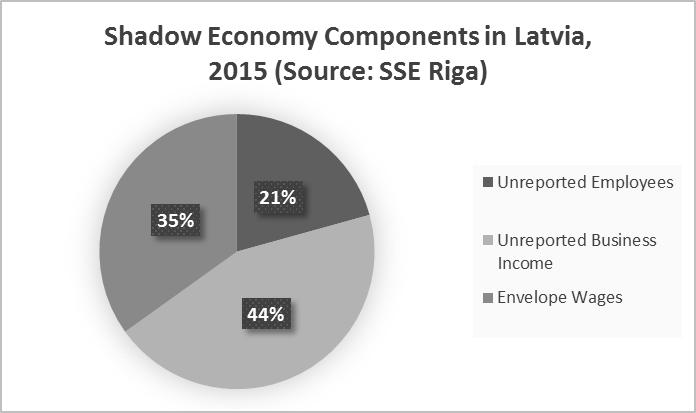Being part of AmCham community brings valuable networking opportunities in different business areas as well as informal connections within Business After Hours.
Janis Zigurs, Business Manager Baltics & Iceland at Kenvue

Dainis Butners, who interned at AmCham this summer, is AmCham individual member and President of the European Business Association of the McDonough School of Business at Georgetown University. Dainis has written three articles in a series "An American in Riga - the View from Washington".
Migration & Shortage of Qualified Labor
One of the biggest challenges that will impact future business in Latvia is its population problem. Currently, the country is experiencing an emigration of highly educated workers to the rest of the European Union. According to the Central Statistics Bureau of Latvia, since the beginning of 2010, Latvian population has dropped by 170,000 or 8% of the population. (i) Over the long-term since 2000, according to The Economist magazine, Latvia's working-age population has dropped by a quarter as emigration to Western Europe continues. The country is not alone in this. Across Northern and Eastern Europe, where birth rates are low and emigration rates high, the loss of working age populations has increasingly become a concern for national governments and municipalities.
 What is of particular concern for business and foreign investment is the lack of highly trained and educated labor. According to the IMF's report Emigration and Its Economic Impact on Eastern Europe, emigrants' education level tends to be higher than their respective national levels. As demonstrated by the graphic, the 40% of Latvian emigres have tertiary education compared to 20% of the national average. Long-term impacts to the country include the loss of productivity, negative association between educated emigration and effective national governance, and social spending. The brain drain may be offset by immigration but then it becomes a question of the work and role new arrivals take on. For example, most of the 400,000 Ukrainians who obtained residency permits in Poland in 2015 were predominately in agriculture, construction or as household jobs.
What is of particular concern for business and foreign investment is the lack of highly trained and educated labor. According to the IMF's report Emigration and Its Economic Impact on Eastern Europe, emigrants' education level tends to be higher than their respective national levels. As demonstrated by the graphic, the 40% of Latvian emigres have tertiary education compared to 20% of the national average. Long-term impacts to the country include the loss of productivity, negative association between educated emigration and effective national governance, and social spending. The brain drain may be offset by immigration but then it becomes a question of the work and role new arrivals take on. For example, most of the 400,000 Ukrainians who obtained residency permits in Poland in 2015 were predominately in agriculture, construction or as household jobs.
While remittances of wages and money home continues to offset the loss of productivity in the country, labor shortages discourage foreign investment and hurt economic growth. The long-term decrease in the working-age population impacts government tax revenues and the social spending that it supports. According to the Economist, in 2013 Latvia had 3.3 working-age adults for each person older than 65, about the same as Britain and France; by 2030 that is projected to fall to just over two. Considering that government expenditures on pensions already accounts for nearly half of the public spending in Northern and Eastern Europe, this is of particular long-term concern for administrations.
For Latvia and other countries in the region, governments and businesses must learn how to attract and retain new workers. Of note, Lithuania has recently launched "Create for Lithuania" where educated professionals from the diaspora are matched with government jobs. While there is no consistent data on return migration, it is important to state that the combined efforts of businesses and governments to retain labor will have a long-term positive impact.
The Shadow Economy
When it comes to doing business in a country, it is important for new entrants to understand the impacts of the shadow economy on Latvia's GDP and other official economic indicators. For the sake of this article, let us establish an understanding. For years, the field of economics defined shadow economy as an underground economy purely criminal monetary transactions ranging across gun-running, prostitution, the sale of illegal drugs, gambling and so forth. However, we define shadow economy transactions that constitute unreported personal spending and business spending - regardless of criminality. It is an important to draw that distinction because Latvia's official GDP is calculated as the sum of four components of personal spending, business spending, government spending, and net exports. Therefore, underreported economic activity has a significant impact on the national standing of the country's economic development.
For foreign investors doing business in Latvia, we need to know how big is the shadow economy, what are some of the main causes of it, and what can be done to reduce its impact?
In Latvia, the shadow economy accounts for predominately 20.3% of Latvia's GDP and is considerably higher than the ratio in the two neighbouring Baltic countries. The main factors that are 1) the underreporting of business income, 2) the use of "envelope wages" or non-reported salaries, and 3) underreporting of employees within a business. 
Underreporting of business income in other words is income tax avoidance. The use of envelope wages is problematic not only for the government's inability to collect taxes but also for both the company and the employee. Envelope wages constitutes a lack of fair play for lawful companies who adhere to labor laws and pay their taxes. For employees, accepting under-reported wages reduces their access to credit and social benefits. Both the underreporting of business income and envelope wages are considerable problems of the shadow economy in Latvia making up 42.1% and 40.2% of the total Latvian shadow economy respectively.
Size of the Baltic Shadow Economy (% of GDP by sector 2014-2016)
 Source: Stockholm School of Economics in Riga (iii)
Source: Stockholm School of Economics in Riga (iii)
According to the Stockholm School of Economics in Riga, analysis by sector showed that the highest proportion of shadow economy in Latvia is traditionally in the construction sector, followed by the retail trade. The service, wholesale trade, and manufacturing sectors are all steady within 20% of GDP and what can be seen is that the share of shadow activity in the Lithuania and Estonia is considerably smaller.
The ability of the Latvian government to tackle these areas will help increase the quality of working conditions, strengthen trade unions, and reduce unfair competition within the marketplace. According to the authors of the Shadow Economy Index for the Baltic Countries, it was seen that entrepreneurs in all three Baltic countries are of the opinion that the risk to be caught for underreporting of business income, wages, and the number of employees is relatively high. In addition, these same entities were relatively satisfied with the performance of the State Revenue Service (SRS) and relatively unsatisfied with the government's tax policy and support to entrepreneurs. Tax morale is high in all three Baltic countries where businesses not of the opinion that tax evasion "in case there is a chance", would always be justifiable behavior.
Dr. Arnis Sauka emphasizes that "[e]verything leads to the conclusion that company managers in Latvia are patriots of their country and would often rather lead a more peaceful life without avoiding taxes. Thus, not so much campaigns about the usefulness of paying taxes, but rather targeted measures to improve the business environment are the tools that the policy makers should work on more."(iv) Therefore, the continued improvements to the State Revenue Service's performance as well as the government's business policies will continue to improve the business climate here in Latvia.
Perception of Corruption
Another challenge for foreign investors is the perception of corruption and public graft within this country. According to Transparency International 2016 report, Latvia ranks 44th out of 176 countries, dropping 4 places from its 2015 ranking indicating a worsening of perceived corruption.(iv)
DELNA, the Latvian branch of Transparency International, has long advocated for the improvement of government processes and reduction of corruption. In a recent poll, it found that 71% of the Latvian population believe that the government's fight against corruption is going poorly.
 When the country decided to take on NATO and EU ascension, part of the reforms that the government took on was to establish the Corruption Prevention and Combating Bureau (KNAB) in 2002 to take on corruption and transition from the legacy of Soviet occupation. While KNAB has been very effective in tackling issues and raising public awareness of corruption, there is still much to be done. Though it is now 15 years old, no KNAB director has yet completed a full term of office and this has undermined the coordination and management of its enforcement activities.
When the country decided to take on NATO and EU ascension, part of the reforms that the government took on was to establish the Corruption Prevention and Combating Bureau (KNAB) in 2002 to take on corruption and transition from the legacy of Soviet occupation. While KNAB has been very effective in tackling issues and raising public awareness of corruption, there is still much to be done. Though it is now 15 years old, no KNAB director has yet completed a full term of office and this has undermined the coordination and management of its enforcement activities.
Areas of perceived corruption include lack of fairness and transparency in the public procurement process, demands for bribes, unethical behavior of companies, and political party funding.
Developments in the fight against corruption
It is important to take the long-term view of the fight against corruption. Over the years since the Financial Crisis of 2008, the country has progressively tackled the perception of corruption as part of the recovery. As can be seen in the graphic, Latvia's ranking has improved over the years.
Latvia Corruption Ranking (2006-2017)
Source: TradingEconomics.com (2016)
As part of its ascension into the OECD, Latvia ratified the OECD Anti-Bribery Convention and the provisions went into force on 21 March 2014.
However, even with OECD ascension, there are still a number of deficiencies in the enforcement system. At the moment, there are no requirements or formal guidelines directing companies to impose or require effective compliance systems for their suppliers, subsidiaries and joint ventures, to prohibit, prevent and detect unlawful conduct. (v) In addition, Whistleblower protection and complaints mechanisms are not adequate as there is no specific instruction on how to avoid passing on a whistleblower's information to the head of that whistleblower's organization and no schemes to ensure protection from retaliation.
In order to help improve the business climate for the country, a number of measures can be effective in tackling the perception of corruption. In response to Latvia's decline in rankings within the Transparency International Corruption Perception Index for 2016, DELNA offered a number of measures to assist with recovering the country's fight against perceived corruption.
Passage and implementation of a Whistleblower Protection Law and introduce whistleblowing mechanisms to both protect individuals who expose corporate wrong-doing as well as enforcing government regulators to tackle the issue. It is necessary to enhance current corruption prevention, investigation and prosecution measures in order to reduce lawlessness and the sense of impunity of high-rank officials. In addition, efforts towards the formation of true beneficiaries registry for companies and adequate sanctions for people involved in money-laundering schemes will go a long way in fighting the perceptions of corruption.
In addition to DELNA's recommendations, a number of other efforts are ongoing. The continued digitization of public administration in order to make government more open and accountable - an effort that the State Revenue Service has been undertaking recently. Also, a recent law that has been proposed and reviewed within the Latvian parliament requires professional auditors to inform KNAB if they detect any illegal activity in the companies they audit. This bill clarifies the existing general requirement of the criminal law that individuals who observe or detect a crime should inform the law enforcement agencies. At this time, it is still being reviewed in Saeima and continues to gain popular support.
Looking Ahead
While the challenges here in Latvia do present obstacles for foreign investors seeking to conduct business here, it is important to remind ourselves that several lines of efforts are helping to improvement the overall situation.
The legislation being discussed and debated in the Saeima is a clear sign that the government is working towards improving the business climate of the country. This has already been re-affirmed by Prime Minister Maris Kucinskis when he met with the Foreign Investors Council In Latvia (FICIL) in May of 2017 (vii). The government's priorities are continued progress along the lines of efforts regarding sustainable economic development, justice and the rule of law, the availability of workforce and education, and efforts to counter the informal economy.
The ascension of Latvia into the OECD in July of 2016 has already had a significant impact on the country in that it has raised the profile of the country outside the European Union. The OECD framework shapes the global standards and principles of economic and development policy for entities such as the G20. As a member of the OECD, Latvia now has a seat at the table with other high income world economies.
 The impacts of the current brain-drain and challenges of migration of talented labor from Latvia will continue to be dealt with into the future. While current policies such as the "Create For Lithuania" program have yet to see the full scale of their impacts, it may be more so that most of the economies of Eastern and Northern Europe are finally catching up to those of Western Europe. It appears that the difference in GDP between the older members of the European Union and the newly ascended ones (viii). This in turn should have a cascade effect where improved economic performance reduces the incentive to emigrate, provide for better labor prospects, and increase higher wealth.
The impacts of the current brain-drain and challenges of migration of talented labor from Latvia will continue to be dealt with into the future. While current policies such as the "Create For Lithuania" program have yet to see the full scale of their impacts, it may be more so that most of the economies of Eastern and Northern Europe are finally catching up to those of Western Europe. It appears that the difference in GDP between the older members of the European Union and the newly ascended ones (viii). This in turn should have a cascade effect where improved economic performance reduces the incentive to emigrate, provide for better labor prospects, and increase higher wealth.
Therefore, for a foreign investor looking to conduct business here in Latvia, part of the decision is understanding the challenges that face the business climate. While there are significant challenges, the continued progression and improvements in the underlying economic structure of the country will provide for an environment that is suitable for investors and their businesses.
Dainis Butners is an individual member of the American Chamber of Commerce in Latvia and President of the European Business Association of the McDonough School of Business at Georgetown University.
This article is the first in a series ‘An American in Riga - the View from Washington'. Next the author will look at the geopolitical challenges in the Baltic Sea Region that foreign investors need to be aware of prior to investing as part of proper due diligence.
_____________________________________
i "Latvia population keeps declining; Riga population increases." Central Statistical Bureau of Latvia, 30 May 2017. http://www.csb.gov.lv/en/notikumi/latvia-population-keeps-declining-riga-population-increases-45900.html.
ii "Eastern Europe's workers are emigrating, but its pensioners are staying." The Economist, 19 January 2017. https://www.economist.com/news/europe/21714999-eus-newest-members-face-economic-decline-unless-they-woo-back-workers-or-recruit-immigrants.
iii Dr. Arnis Sauka, and Dr. Tālis Putniņš. "Shadow Economy Index for the Baltic Countries." Stockholm School of Economics in Riga, 10 May 2017. http://www.sseriga.edu/en/centres/csb/shadow-economy-index-for-baltics/.
iv Ibid.
v "Latvia." Exporting Corruption: Assessing Enforcement of the OECD Convention on Combating Foreign Bribery. Transparency International, 2016. https://www.transparency.org/exporting_corruption/Latvia.
vi "Transparency International: Latvia has the highest corruption level among Baltics ." Baltic News Network. BNN, Published 25 Jan. 2017. http://bnn-news.com/transparency-international-latvia-has-the-highest-corruption-level-among-baltics-159093
vii "Government and investors agree on priorities to improve investment climate in Latvia." News Releases. Investment and Development Agency of Latvia, 27 May 2017. http://www.liaa.gov.lv/en/news/government-and-investors-agree-priorities-improve-investment-climate-latvia.
viii Romei, Valentina. "Eastern Europe has the largest population loss in modern history." FT Data. Financial Times, 27 May 2016. http://blogs.ft.com/ftdata/2016/05/27/eastern-europe-has-the-largest-population-loss-in-modern-history/#.

Being part of AmCham community brings valuable networking opportunities in different business areas as well as informal connections within Business After Hours.
Janis Zigurs, Business Manager Baltics & Iceland at Kenvue